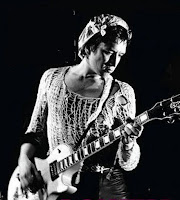(R) Ken Doll wearing a pastel pink and mint green striped
two-piece beach set by Mattel [2]
For me, pink is one of the essential colours of punk: which is undoubtedly why Jamie Reid used it (along with bright yellow and black) for the provocatively lurid sleeve of Never Mind the Bollocks and why, many years earlier, the proto-punk fashion designer Elsa Schiaparelli had created a shocking shade of pink to be synonymous with her brand.
Thus, when I wore a pink (and white) ensemble for an event in Bloomsbury recently, I was confidently expecting it to be received within the context of the above history of art and fashion.
Unfortunately, there were some young people present that evening whose cultural references are far more contemporary and, in their eyes, I looked like a refugee from Barbie World - which is, arguably, a little unkind, if not entirely unfair: after all, who wants to be thought of as a human doll?
Having said that, if it's okay for Ryan Gosling to be dolled up and dollified, for his role as Ken in the movie Barbie (dir. Greta Gerwig, 2023), then why should I worry?
And even Sid Vicious was ultimately reduced to the status of an action figure following his death (if not, indeed, years prior to his tragic and untimely demise) - although, sadly, not wearing the pair of pink peg-leg pants that he loved so much ... [4]
Jamie Reid: Sid Vicious Action Man
£12.50 [3]
Notes
[1] Photo by Paul Gorman taken on 7 Sept 2023 outside Treadwell's Bookshop (London)
[2] Anyone interested in buying the doll (£44.99) can visit the Mattel website by clicking here.
[3] This image by Jamie Reid was used to promote the Sex Pistols single 'Something Else', released from the album The Great Rock 'n' Roll Swindle (Virgin Records, 1979). The original poster is in the Jamie Reid archive at the V&A and can be viewed online by clicking here. Obviously, Reid is critiquing the co-option and commodification of punk by the Spectacle (as well as, perhaps, the exploitation of dead performers, who will never be allowed to rest in peace so long as they can still shift product).
[4] Sid can be seen wearing these pink pegs in a short film on Youtube provided by ITV Channel Television, which shows the Sex Pistols at Jersey Airport in the summer of 1977 about to board a plane, having been officially ordered to leave the island: click here. Paul Gorman informs me that Sid had actually borrowed the trousers from guitarist Steve Jones, who had bought them years earlier from Let It Rock.
For a post published back in Feb 2019 on the politics of pink, click here.


%201983.jpg)
.jpg)

.jpg)
.jpg)
.jpg)
.jpeg)

.jpg)







.jpg)
.png)
